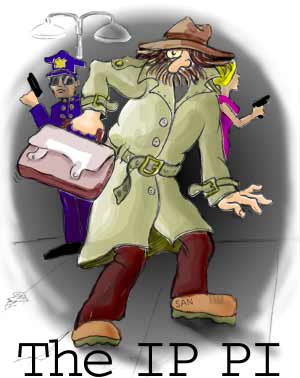|
By Rebecca Rohan


|
|
From the window of his home office on Whidbey Island, Wash., Private Investigator Chris Horsch opens the working day with a view of Mt. Baker and eagles soaring over Puget Sound. Parasailers launch from a nearby bluff overlooking Port Townsend, and when Horsch goes out to run with his two dogs (a Jack Russell Terrier and "Tiffy the Blind Spy Dog," a nearly sightless schnauzer who often accompanies him on undercover jobs) the landscape of the place he calls home blends seamlessly with his professional domain.
Horsch talks about his work, beginning with the rites of morning. "Usually I have some coffee and grab a blank pad of paper and my calendar," he says, revealing in his speech a trace of Minnesota. He makes a "to do" list, attends to correspondence, does the office work. "I'd much rather be working on a mental puzzle that's part of a case," he says. "I'm more creative in the morning." But work is work and there's no time like the present. He checks the fax for reports from sources and clients.
At about 10 a.m., he usually stops for breakfast and takes a drive to pick up the day's mail. If business doesn't keep him in the field, Horsch might come back home and dive into research material spread out over four large tables. "I take a 10-minute power nap every day, right after lunch," he says. "Then it's time to go back to work." He tries not to tackle anything after 8 p.m. and to take Sundays off.
1099 spoke with Horsch on a Monday.
"It's not like what you see on TV," Horsch says of the PI's life. He doesn't chase cars, enter illegally, plant listening devices, or run around waving a gun; he's careful not to trespass, even. After all, he's got a Washington State detective's license to protect, and an "agency operator's license," which permits him to be his own boss. Indeed, Horsch follows the same mundane laws the rest of us do.
Yet a typical day for Horsch -- bug sweeps, surveillance missions, disguises, clients panting in desperation -- isn't your typical day at the office, and the vicissitudes of his trade often pitch him headlong into peculiar scenarios.
The average private detective agency in the State of Washington has 2.5 employees and handles all manner of investigations. Horsch runs a one-man shop and specializes in electronic countermeasure cases and financial investigations for attorneys, such as finding out what assets a person or business had before a judgment against them. "Our concern isn't so much what people have now, but what they used to have," he says. "Many times things are fraudulently conveyed in anticipation of losing a lawsuit. If a person owned a construction company with a lot of tractors, where did the tractors go?" He avoids domestic cases as much as possible.
"A lot of people offer surveillance and various services, and there's a lot of competition if you don't carve your own niche," says Horsch, who also gives classes in private investigation to small groups of aspiring sleuths a few times a year. "I encourage people who get really good at something to offer something other than the same loaf of white bread."
Many of Horsch's clients come to him on referral from two reliable "associates," also PIs, who send him work for a cut of the fee. Horsch's top associate, Steve Hamre, a mentor and former employer, has expertise in polygraph testing, internal theft, and domestic cases -- specialties that compliment Horsch's own.
A Near Change of Plans
As an IP, Horsch has the considerable freedom to choose the cases he wants to take and to refuse all others. Still, he has to be flexible; a PI's work won't fit into bankers' hours. On a day not long ago, for example, Horsch was to drive into Seattle to school a fellow PI in the art of clock/video-camera gadgetry when the phone rang.
"Last night I had a call," he says. It was from a reliable source. "So I postponed the meeting about the clock to go out on a debugging -- and the client canceled."
An irritating false alarm. As often happens with non-corporate clients, people ordering electronic debugging change their minds. "They can be on a roller coaster of emotions when they call," Horsch says. "They say, 'I don't know if somebody's bugging my phone or my house' -- which would make any of us uncomfortable." The problem, he says, is that "their decision-making capabilities are probably not what they would normally be." Once they calm down, they cancel the order.
|

Horsch sympathizes with "consumer clients" but corporate clients are more reliable.
 |
|
Horsch says he sympathizes with "consumer clients" (individuals), but that corporate clients tend to be more reliable. "If a company calls and believes a telemarketer is sharing leads with a competitor, emotions are just as high, but a couple of people are usually making the decision to order the service," not one. "Those cases tend to result in paying customers."
In the end, Horsch heads to town to give the clock/camera demonstration, but his day isn't through.
Later, he's again called upon to ferret out a listening device, this time from a modest two-bedroom, two-bath home where child custody is in dispute. At the site, Horsch draws the client outside to talk. He explains the protocol and the client signs a service agreement. Then -- armed with headgear and a five-foot wand for snooping in awkward places (inside track lighting fixtures, say) -- Horsch goes in.
He's done it a thousand times. His eyes dart from nook to corner to cranny to the monitor on his wand. He makes adjustments and keeps searching. Three hours later he's gone through 80 percent of the building. Suddenly, success: Just off the kitchen, inside a curtain rod in the family room, he finds a circuit board about the size of a quarter and powered by a 9-volt battery. An amateur's bug for sure, but a bug no less. He leads the client outside and reveals the news, then finishes sweeping the house.
Horsch's work is done, and the ball bounces into the client's court.
"This is one of those cases where the personal rewards are more gratifying than the monetary," says Horsch.
|

You do an isolated piece for a client and wonder what happened beyond that point.
 |
|
Back in his office, Horsch says, "Just because I found one doesn't mean there aren't two." In fact, he doesn't know how the story turned out, except that the client wanted to leave the bug in place and call the police. "That's part of being in this business," he says. "You do an isolated piece for a client and wonder what happened beyond that point."
Others cases have happier endings. Some time earlier, a probate attorney hired Horsch to prove that an estate had tried to contact a beneficiary who hadn't been heard from in 50 years. Instead of proving the attempt to contact, however, Horsch went out and found her. Later, the beneficiary called to say she appreciated what he'd done; she had been desperate for a new refrigerator and now could buy it.
|

Half of his professional time goes to case work, a quarter to administration, and a quarter to marketing.
 |
|
Business Matters
Catch this IP PI on another day and his schedule might look very different. With four to a dozen projects of various lengths and types going at a time, he has plenty to do, not to mention cultivating business. Horsch estimates that half of his professional time goes to case work, a quarter to administration, and a quarter to marketing. He's always trying to trim administration time. (Recently, he signed up for a free 30-day trial of a postal meter and scale to avoid standing in line at the Post Office.) "If you get caught up in the administrative," he says, "you're ignoring the marketing and ignoring the essential things that pay the bills."
For Horsch, marketing means calling attorneys who need financial investigations and strengthening the referral network that feeds him electronic counter-measure cases, his specialty. Referrals save money and circumvent middle-of-the-night nuisance calls from jealous suspicious cranks who've had too much to drink, he says.
Horsch's marketing arsenal also includes impeccable business cards, letterhead, envelopes, and so on. "Don't ever skimp on your image tools," he says. "Spend more there and make cuts in other areas."
For a man who reveals, discovers, and exposes others for a living, Horsch makes himself scarce: He not only lives on an island, but he doesn't list his phone number or advertise in the Yellow Pages. He uses a 24-hour answering service (425-771-5288) and alphanumeric pager to screen calls, most of which come from his primary sources -- Hamre, a man he calls "Joe," and Fox's Spy Outlet, a Seattle security products firm.
Tricks of the Trade
These days Horsch is taking fewer and fewer surveillance cases; he prefers the relative comfort of online research in a library to sitting in a car for 12 hours at a time. He knows all the stake-out tricks, though, and gave a few away:
Avoid eating sugar and overeating -- both make you tired. Keep liquids to a minimum. Bring peanuts or black olives, carrot sticks, and possibly beef jerky. "A small cooler with vegetables is always better than a heavy bread sandwich," he says. "I always remember to bring water, a change of clothes, two hats, a couple of pairs of sun glasses, two different coats -- things that may be needed to change my appearance." Dressing for the temperature is important, too, since the only spot to park may be in the sun. All the disguises, plus electronic gear, camera, film, video, batteries, tape recorder, and binoculars have to be tucked out of site so it doesn't look like a stake-out if the subject walks up to the car.
For "Tiffy the Blind Spy Dog" Horsch carries along a water dish, food, and blankets. With Tiffy at his side, he says, he can walk right past a residence without looking suspicious. Whether canine or human (especially someone of the opposite sex), a companion makes "you just look more friendly."
|
|


